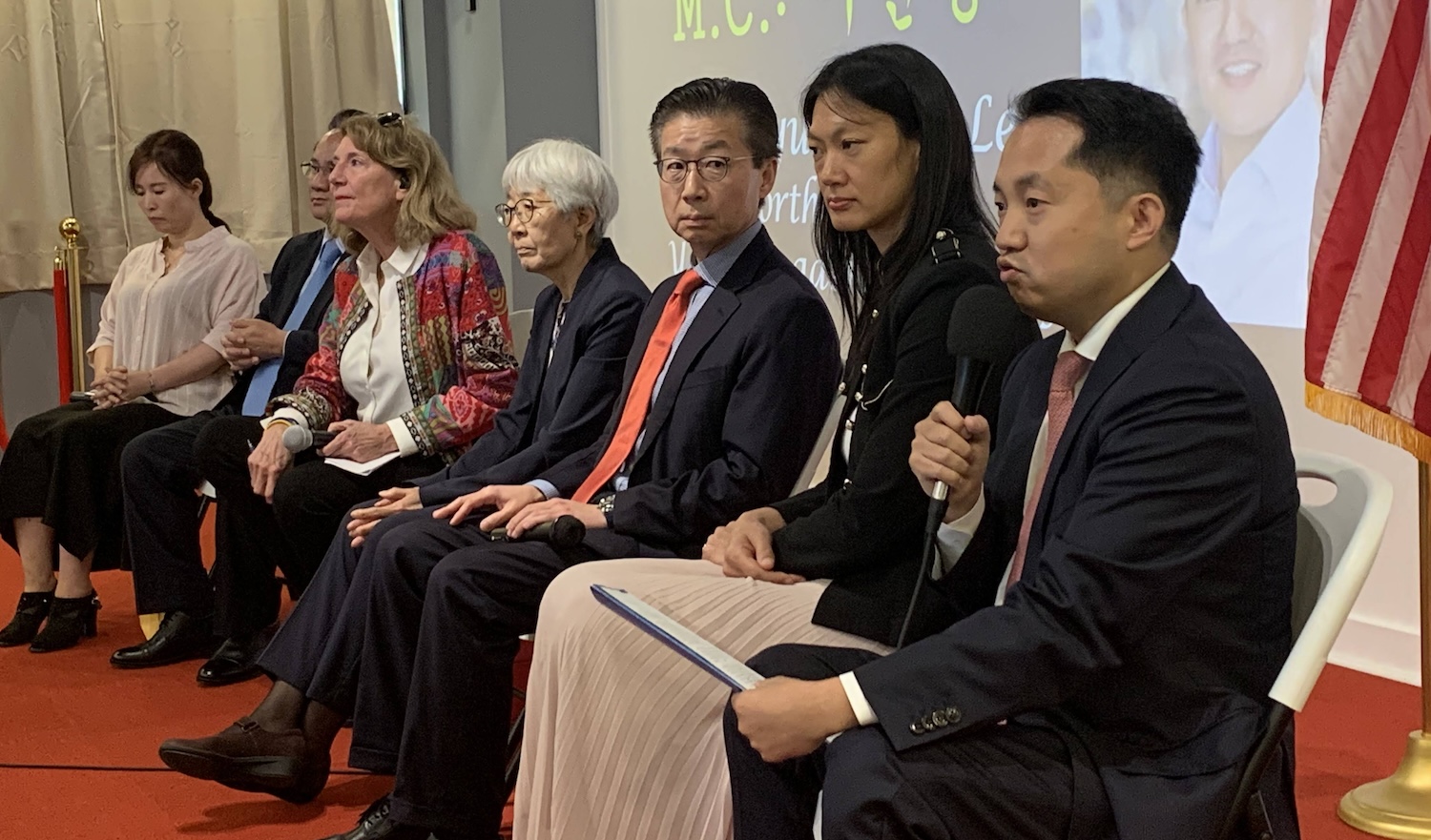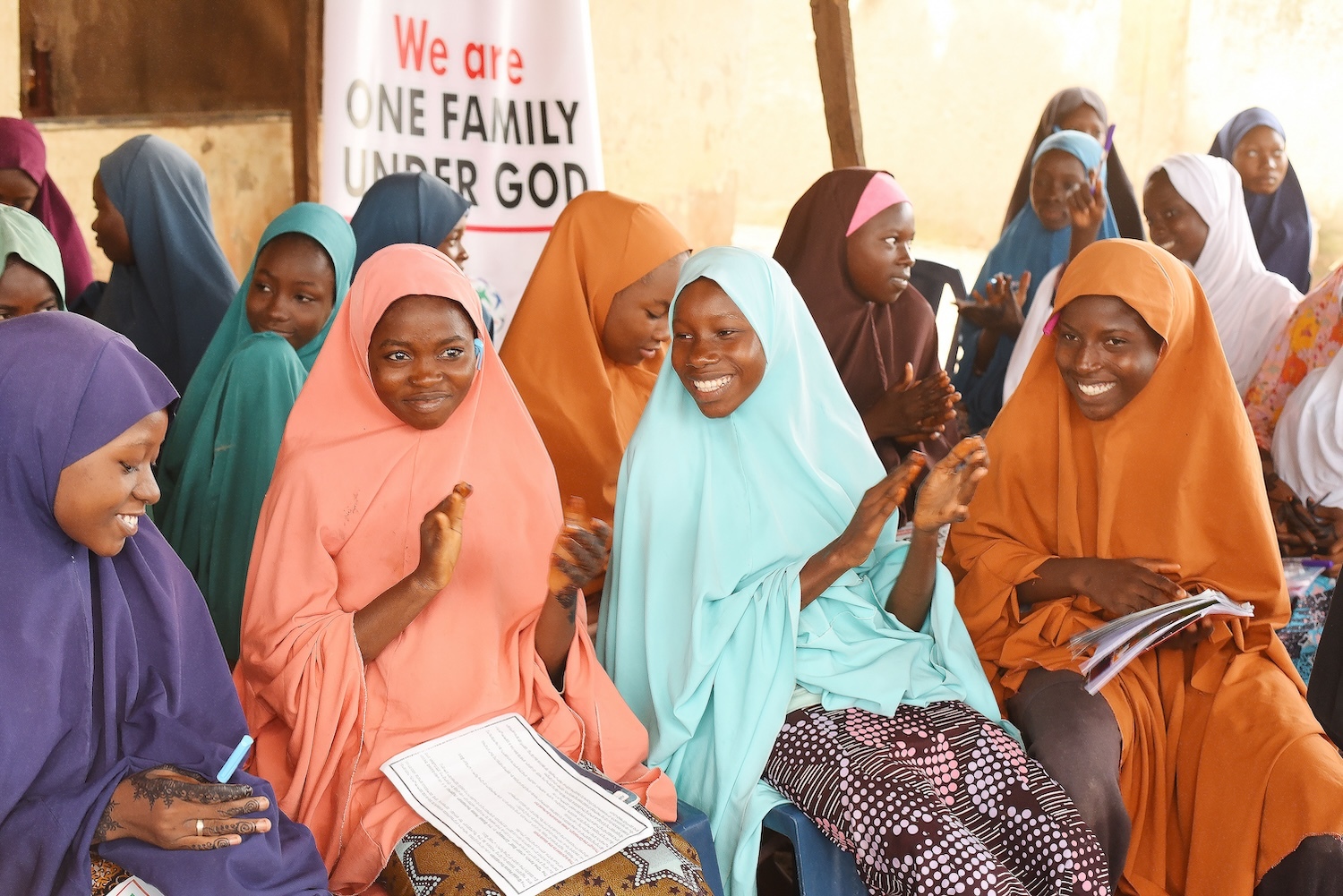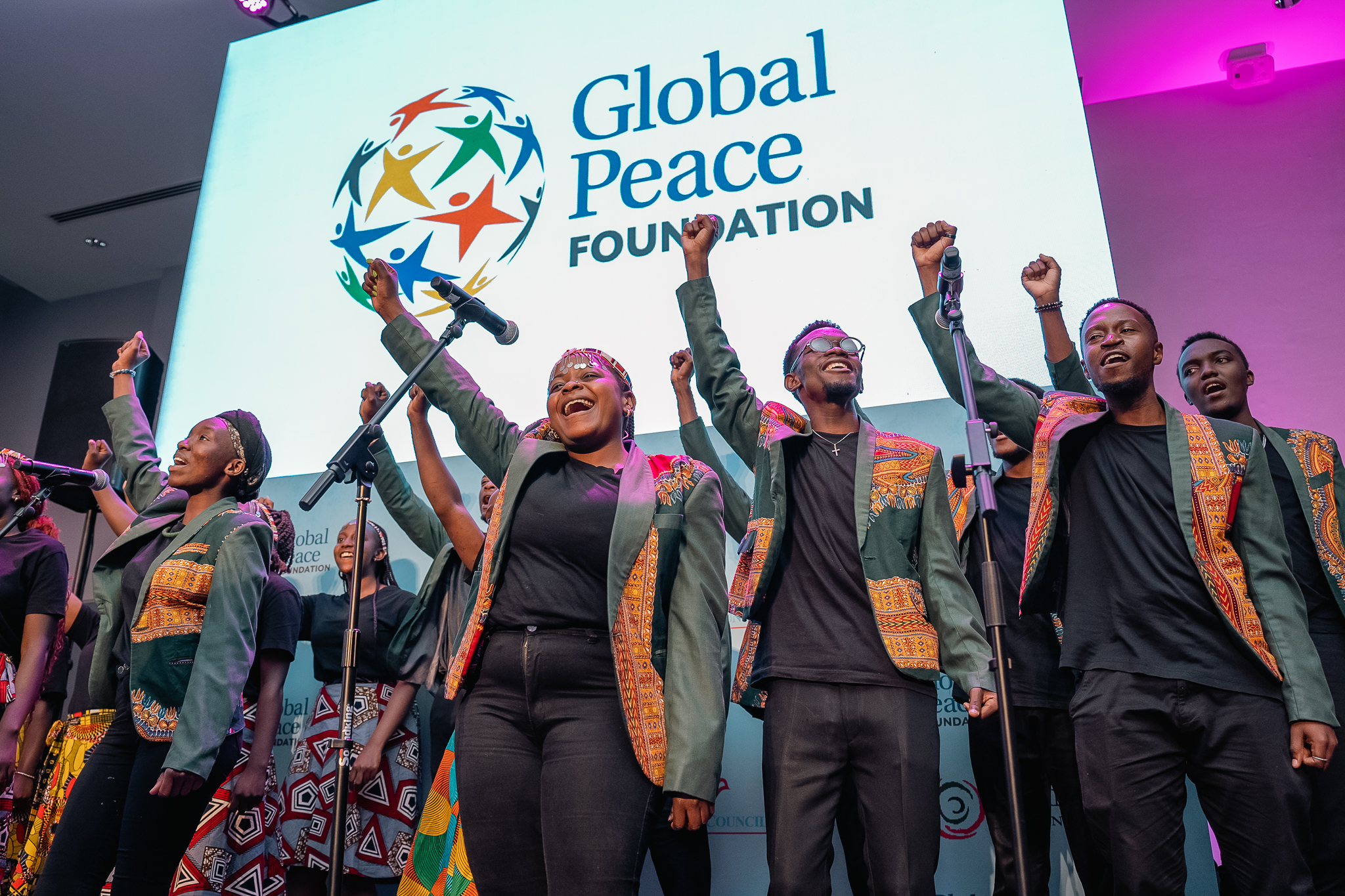October 31, Belfast | Forty diverse faith and community leaders gathered at the Sakinos Center in Belfast, Northern Ireland for a forum to address the theme ‘Cross-community Engagement: The Role of Faith Leaders in Conflict Resolution and Peace-building.’
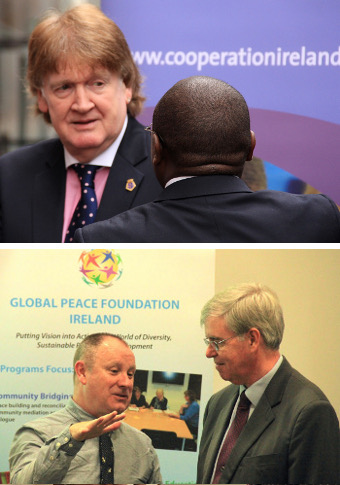
Above: (left to right) Dr. Alan Largey, Cooperation Ireland, Mr. Arnold Keshembe, Global Peace Foundation-Ireland, Below: Dr. Gary Mason, East Belfast Mission, Mr. James Flynn, International President, Global Peace Foundation
The forum, which ran from October 29 to the 31 sought to address the question, “How can the moral authority of religious and spiritual leaders be utilized to resolve conflict, address social and civic issues, and facilitate collaboration across lines of religious identity?” Participants examined the lessons learned from the experiences of Northern Ireland in ending 30 years of armed conflict known as The Troubles, and drew on best practices for building social cohesion and cross-community engagement in places like Nigeria and the United States, where conflicts remain prevalent and sometimes threatens to escalate to avoidable conflicts.
The Global Peace Foundation in partnership with Co-operation Ireland organized the three day together with sponsors like the Skainos Center at the East Belfast Mission, the Corrymeela Community, and the Institute for the Study of Conflict Transformation and Social Justice at Queens University Belfast.
Participants came from the United Kingdom, United States of America, the Republic of Ireland and Nigeria. Among the esteemed representatives from Nigeria were His Royal Highness, Alhaji Zubair Jibril Maigwari II, the Emir of Birnin Gwari in Kaduna State, representing the Sultan of Sokoto; and Bishop Joseph Bagobiri of the Roman Catholic Diocese of Kafanchan in Kaduna state, representing the President of the Christian Association of Nigeria, Pastor Ayo Oritsejafor. Other distinguished delegates from Nigeria were: His Eminence Dr Samuel C.K Uche, Prelate of the Methodist Church of Nigeria and Bishop Sunday Onuoha, Executive Director, Nigerian Inter-Faith Action Association.
The international delegates began their experience with a special guided tour by Dr. Alan Largey and Mr. Barry Fennell of Co-operation Ireland. The tour through Belfast gave the group up-close exposure to the division that spurred the The Troubles. The Peace Walls, physical walls that separate communities, are covered with murals carrying different messages from both loyalists and republicans.
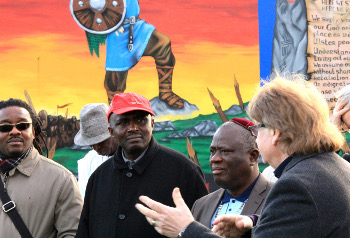
Dr. Alan Largey, Co-operation Ireland takes Nigerian delegation to see Murals and Peace Walls in Belfast, Northern Ireland.
The forum was hosted at the Skainos Project in the Ballymacarrett area of East Belfast. It is an inclusive space where people of all faiths can gather, eat meals together, worship, and find help for health, employment, education, childcare, housing, and spiritual concerns. Derived from a Greek word used in the Christian bibile, Skainos emphasizes the importance of practical engagement with a community by figuratively pitching a tent in its midst, and it hints at the notion of hospitality and the extended family.
Dr. Garry Mason, from the East Belfast Mission welcomed the participants and GPF International President Mr. Jim Flynn gave the opening remarks, providing the rational of the Forum and the background of GPF’s work based on its vision that all humanity is One Family Under God.
Main speakers included Prof. John Brewer of Queen University Belfast and His Eminence, Dr Samuel C.K Uche, Prelate of the Methodist Church of Nigeria. Prof. Both speakers touched on the importance of faith leaders as models who should exemplify moral authority by putting the society’s shared values into practice.
Brewer distinguished between passive peace making, believing in the values of peace, tolerance and compromise as an expression against violence, and active peace making, putting those values in practice. He explained that Northern Ireland had applied passive peace by ending violence, but still needs to work on active peace by the reintroduction and practicing wider values. Prof. Brewer challenged faith leaders present at the forum to be actively involved in the peace process, citing that in the past church institutions in Northern Ireland did not do enough to stop the conflict.
His Eminence Dr Samuel C.K Uche asserted that faith leaders have a big role to play in conflict resolution and world peace. He pointed specific aspects like educating the youth and guiding political and government leaders to apply good governance. His Eminence. promised to replicate the model of the Skainos Project in Nigeria and thanked GPF and Co-operation Ireland for organizing the forum which gave him look into the conflict in Northern Ireland, and encouraged his work in Nigeria.

Speakers (left to right): Mr. Peter Sheridan, the CEO of Co-operation Ireland, Dr Samuel C.K Uche, Prelate of the Methodist Church of Nigeria, Prof. John Brewer of Queen University Belfast, Bishop Sunday Onouha of the Methodist Church and Executive Director of the Nigeria Inter-faith Action Association (NIFA).
Two panels drawing on the specific work in Nigeria and Ireland followed. The first addressed the topic: “Cross-Community Engagement,” featuring the Emir of Birnin Gwari in Kaduna State; Bishop Joseph Bagobiri of Kafanchan Diocese in Nigeria; Padraig O’Tuama, the leader of Corrymeela Community in Northern Ireland; and Barry Fennell from Co-operation Ireland.
Bishop Joseph conveyed lessons from his over 17 years of work with interfaith in Nigeria, first as the pioneer chairman of the Mission and Dialogue Department of the Catholic Secretariat of Nigeria; and then as chairman of the Episcopal Commission for Inter-religious Dialogue of the Anglophone West African Countries. The Emir of Birin Gwari condemned the violence and criminal acts perpetrated by extremist, Islamic fundamentalists group, using the example of Boko Haram in Nigeria, stating that they do not represent Islam, or the values of Islam. Both called for concerted efforts in neutralizing the capacity of Boko Haram, and promised to brief their constituencies the Northern Ireland forum and find more innovative ways of working together to address the malaise.

Panel on “Cross-Community Engagement” (panelist left to right): Bishop Joseph Bagobiri of Kafanchan Diocese in Nigeria; Padraig O’Tuama, the leader of Corrymeela Community in Northern Ireland; Emir of Birnin Gwari in Kaduna State and Barry Fennell from Co-operation Ireland.
Padraig O’ Tuama shared his experience building peace in Northern Ireland as the leader of Corrymeela Community, a Christian community that promotes reconciliation and peace through healing the social, religious and political divisions. Mr. O’Tauma has used many approaches like poetry, theology, conflict transformation, respite, encounter, dialogue and reflective learning. Mr. Barry Fennell of Co-operation Ireland explained the work of Co-operation Ireland which has help achieved significant progress in the peace building in Northern Ireland at the political and grass-roots levels. Among the most memorable moments was the facilitation of Queen Elizabeth’s first visit to Ireland and Northern Ireland, and the Irish President’s first visit to the Queen’s at Windsor Castle.
The afternoon panel entitled “Northern Ireland/ Nigeria – Shared Learning and Best Practices: Moral Authorities as Catalysts for Peacebuilding” included Dr. Garry Mason of the Methodist Church Belfast, Mr. Peter Sheridan, the CEO of Cooperation Ireland, and Bishop Sunday Onouha of the Methodist Church and Executive Director of the Nigeria Inter-faith Action Association (NIFA). Each case study reemphasized the power of faith leaders collaborating together around shared value to bring real progress in meeting the spiritual, social, and health needs of people.

The forum brought together an unlikely pair of Ireland and Nigeria, but yielded rich and deep exchanges between faith leaders who have worked together to address common problems in their community. There was also resounding consensus that the engagement of faith leaders is essential to building long-lasting peace.

